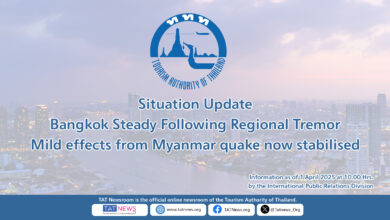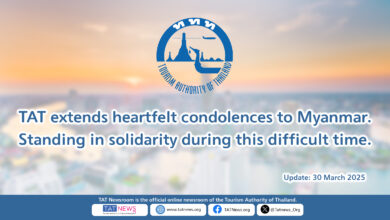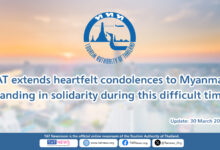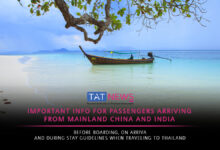Bangkok, 05 July, 2020 – Thailand has announced its health capability to manage the Coronavirus Disease 2019 (COVID-19) pandemic as the kingdom is opening doors for 11 groups of Thai and non-Thai nationals from earlier this month.
The Royal Thai Government is also considering local tours for medical and wellness tourists from overseas from next month, and to restart inbound tourism under a “travel bubbles” concept in September.
The 11 groups of Thai and non-Thai nationals, currently allowed to enter Thailand with “Certificate of Entry” from a Thai embassy or consulate overseas, include foreigners who require medical treatment – except for COVID-19 – in Thailand, and their attendants, and foreigners permitted to enter the kingdom under a special arrangement with a foreign country.
Thus far, Thailand has recorded no new local cases of COVID-19 infection for over a month. The nation has gradually given the green light for businesses and activities to resume normal operations in phases, including phase one from 3 May, phase two from 17 May, phase three from 1 June, phase four from 15 June, and most recently phase five from 1 July.
According to the Centre for COVID-19 Situation Administration (CCSA), Thailand is well equipped with health capabilities to manage the pandemic, including an adequate number of hospital beds in Bangkok and elsewhere in the country. A total of 568 beds at hotels designated as state quarantine locations have been assigned nationwide.
In terms of medical supplies, Thailand currently has 1,127,970 N95 surgical masks, 511,578 sets of personal protective equipment (PPE), 11,096 ventilators, and 319,994 tablets of Favipiravir, which can be used for approximately 4,571 patients.
Thailand is implementing its screening, quarantine, and reporting measures for international arrivals to the country per the traveller’s destination of origin and final destination in the country.
The isolation and quarantine approaches include:
- Local quarantine for interprovincial travellers, state quarantine for international arrivals, and alternative state quarantine for international arrivals at their own expense.
- Home (self-monitoring).
- Organisational quarantine.
- Hospital quarantine for close observation.
According to the CCSA, Thailand’s health capability and unprecedented measures on the COVID-19 prevention will allow the country to maintain the “zero local case” for as long as possible for the health and safety of the over 67 million citizens of Thailand, especially as the country is opening doors for more international arrivals.
In the meantime, the CCSA recommends that everyone remain on guard by observing the social distancing rules, wearing masks and frequently washing hands to protect themselves and others from communicable diseases.






